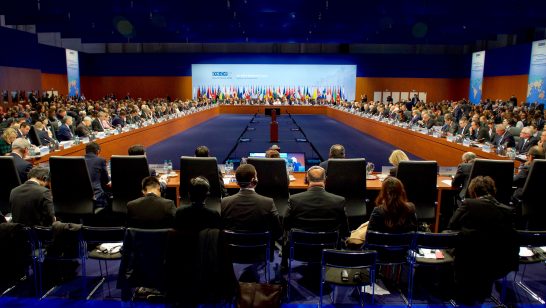On 7th November 2015 the European Leadership Network (ELN), in cooperation with the Russian International Affairs Council (RIAC), hosted an event in London on the competing legal and political narratives between Russia and the West. The meeting was intended to provoke focused debates on the Western and Russian interpretations of a series of key concepts and principles related to the European and wider international order.
During the seminar the participants aimed at identifying the crucial differences between the Western and Russian narratives, and tried to identify any common ground that remains. The attendees did not seek to assign blame for the crisis or to force consensus where the positions of the participants were clearly divergent, only to bring greater clarity by exploring the territory and on that basis, perhaps identify a more fruitful way forward.
The event consisted of three sessions, focusing on the following:
Session One: Russian and Western views on the nature of European security order in the 21st century
• What are the most important principle(s) of European order for each side?
• What is the normative foundation of European security order? Are the Helsinki / Paris principles still valid?
• What is needed: Reinterpretation/update of the current system? A new system? Comeback to implementing the existing principles?
Session Two: Respect for sovereignty, use of force and the principle of non-intervention in internal affairs of other States
• The nature of state’s sovereignty and its limits
• ‘Permissible’ interventions into a political and social processes inside a state
• Interpreting the exceptions to prohibition of the use of force: humanitarian intervention, responsibility to protect
• Applicability of the prohibition principle to new dimensions: proxy or ‘deniable’ interventions, “hybrid”, cyber, information warfare
Session Three: Inviolability of borders, territorial integrity of states and self-determination of peoples
• Can there be a common legal approach to integrity of states and self-determination in Europe?
• Dealing with the ‘frozen’ conflicts and unrecognized/not universally recognized entities
• Impact and “lessons learned” of breakup of Yugoslavia, conflicts following the Soviet Union’s dissolution, Kosovo and Crimea
The event brought together a number of experts from across the European continent representing a wide variety of institutions; the full list of attendees is available below:
1. Dr Derek Averre, Senior Lecturer in Russian Foreign and Security Policy, Centre for Russian, European and Eurasian Studies, University of Birmingham
2. Professor Marc Weller, Director of the Lauterpacht Centre for International Law, University of Cambridge
3. Natalino Ronzitti, Scientific Advisor, IAI Istituto Affari Internazionali, Rome
4. Oleksandr Tytarchuk, Senior Research Fellow, Foreign Policy Research Institute (FPRI) at the Diplomatic Academy of Ukraine
5. Professor Richard Sakwa, Professor of Russian and European Politics, University of Kent
6. Professor Roy Allison, Professor of Russian and Eurasian International Relations, Head of Russian and East European Studies, the School of Interdisciplinary Area Studies (SIAS), University of Oxford
7. Dr Xymena Kurowska, Associate Professor, Department of International Relations, Center for European Union Research, Hungary
8. Dr Mikhail Troitsky, Associate Professor at the Department of International Relations and Russia’s Foreign Policy of the MGIMO-University
9. Dr Vera Rusinova, Associate Professor at the Department of International Public and Private Law of the NRU HSE, First Deputy Dean of the Faculty of Law of the NRU HSE
10. Professor Boris Ashavsky, Professor at the Department of International Law, Diplomatic Academy of the Ministry of Foreign Affairs of the Russian Federation
11. Dr Sergey Markedonov, Associate Professor of Department of Regional Studies and Foreign Policy at the Russian State University for the Humanities
12. Dr Sergey Oznobishchev, Head of Division, IMEMO RAS; Professor of the MGIMO-University
13. Dr Ian Kearns, Director, European Leadership Network
14. Shatabhisha Shetty, Deputy Director, European Leadership Network
15. Lukasz Kulesa, Research Director, European Leadership Network
16. Denitsa Raynova, Research Associate, European Leadership Network
17. Thomas Frear, Research Fellow, European Leadership Network
18. Natalia Evtikhevich, Programme Manager, Russian International Affairs Council


